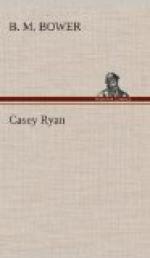Casey was tough, and he never knew when he was whipped. He crawled up to his knees again, saw the same Ford coming at him with dimming headlights from the same direction it had taken before, made a wild grab for it, was knocked down and run over again. You may not believe that, but Casey had the bruises to prove it.
On the third round the Ford had slowed to a walk, figuratively speaking. Casey was pretty dizzy, and he thought his back was broken, but he was mad clear through. He caught the Ford by its fender, hung on, clutching frantically for a better hold, was dragged a little distance so and then, as its speed slackened to a gentle forward roll, he made shift to get aboard and give the engine gas before it had quite stopped. Which he told himself was lucky, because he couldn’t have cranked the thing to save his life.
By sheer dogged nerve he drove to camp, drank cold coffee left from his early breakfast, and decided that the bite of a Ford, while it is poisonous, is not necessarily fatal unless it attacks one in a vital spot.
Casey could not drill a hole, he could not swing a pick; for two days he limped groaning around camp and confined his activities to cooking his meals. Frequently he would look at the Ford and shake his head. There was something uncanny about it.
“She sure has got it in for me,” he mused. “You can’t blame her for runnin’ off when I dropped the reins and stepped out. But that don’t account for the way she come at me, and the way she got me every circle she made. That’s human. It’s dog-gone human! I’ve cussed her a lot, and I’ve done things to her—like that syrup I poured into her—and dog-gone her, she’s been layin’ low and watchin’ her chance all this while. Fords, I believe, are about as human as horses, and I’ve knowed horses I believe coulda talked if their tongues was split. Ask anybody. That there car knowed!”
The third day after the attack Casey was still too sore to work, but he managed to crank the Ford—eyeing it curiously the while, and with respect, too—and started down the mesa and up over the ridge and on down to the lake. He was still studying the matter incredulously, still wondering if Fords can think. He wanted to tell the widow about it and get her opinion. The widow was a smart woman. A little touchy on the liquor question, maybe, but smart. You ask anybody.
Lucky Lode greeted him with dropped jaws and wide staring eyes, which puzzled Casey until the foreman, grasping his shoulder—which made Casey wince and break a promise—explained their astonishment. They had, as Casey expected, seen his lights when he came off the summit from Yucca Pass. By the speed they traveled, Lucky Lode knew that Casey and no other was at the steering wheel, even before he took to the lake.
“And then,” said the foreman, “we saw your lights go round and round in a circle, and disappear—”




